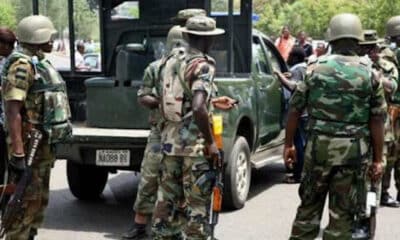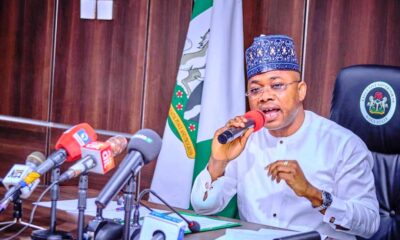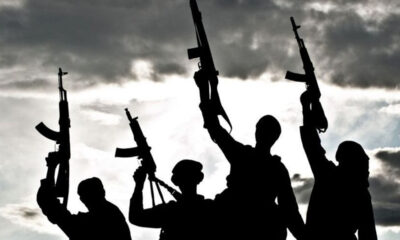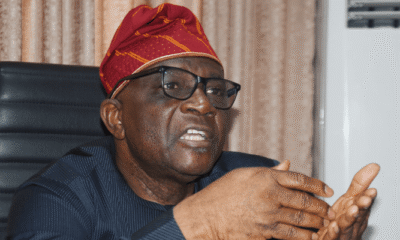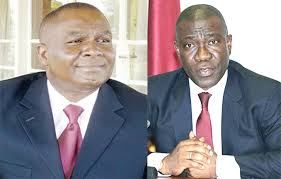Breaking News
Declare full-scale war on bandits, Ex-CDS Irabor tells FG
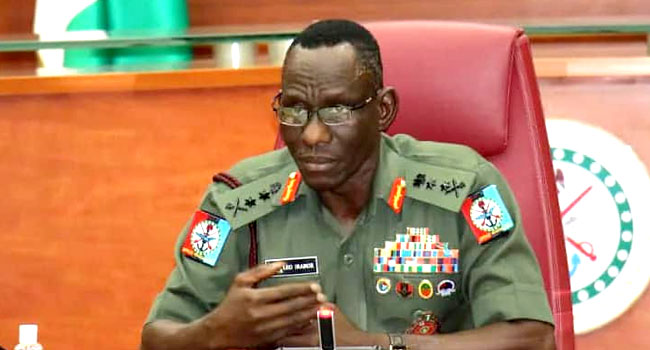
Nigeria’s former Chief of Defence Staff, General Lucky Irabor (retd.), has urged the Federal Government to formally declare war on bandits and insurgents terrorising parts of the country, saying such a step is crucial to effectively mobilise national resources and coordinate the fight against insecurity.
Irabor made the call while speaking on Channels Television’s Politics Today on Monday, where he said the absence of a formal war declaration has limited the country’s capacity to confront the growing threats of banditry, insurgency, and terrorism.
“There are no legal instruments indicating that Nigeria is at war. There’s none, we’re only assuming that we are at war,” he stated.
“Of course, there is a need to declare war in order to aggregate the elements of state power directly to the war effort.”
The retired general explained that an official declaration of war would allow government institutions to channel resources more efficiently toward combating insecurity while strengthening transparency and accountability.
“It will make a huge difference because resourcing will now be properly channelled, and accountability frameworks can be clearly outlined,” he said.
“That way, we’ll be able to see measurable results for the expenditures we make.”
Irabor added that such a declaration would go beyond military intervention, emphasising that all elements of national power, political, economic, diplomatic, and social, must be deployed in a coordinated fashion to tackle insecurity.
“It’s not just the military line of operation. We’re talking about deploying the aggregate of state power beyond just military power to help us,” he said.
Irabor acknowledged that maintaining national security is expensive, but dismissed widespread perceptions that the Nigerian military profits from insecurity.
He, however, noted that political interference and poor leadership decisions have contributed significantly to the persistence of insecurity in parts of the country.
“Security is expensive, but it’s not true that the military is cashing in on insecurity. Politicians’ actions and inactions often exacerbate the situation,” he remarked.
The former Defence Chief advised Nigerian leaders to refrain from politicising national security, warning that doing so undermines the morale of troops and the unity of purpose needed to defeat violent groups.
He said long-term solutions must focus on addressing the underlying risk factors that fuel criminality, such as poverty, unemployment, and the growing number of out-of-school children.
“In my book, I have advocated for a pivot away from excessive reliance on military power to using other tools like government policies,” Irabor said.
“If we’re able to reduce the number of out-of-school children and those who are unemployed, then we’ll also reduce the pool of people that criminals recruit from.”
Irabor’s comments come amid recurring attacks by bandits and insurgents across several northern states, where hundreds of residents have been killed and communities displaced in recent months.
In April 2025, for instance, bandits attacked parts of Benue State, razing homes and leaving scores dead, one of several such incidents this year.
Meanwhile, in his Independence Day broadcast to mark Nigeria’s 65th anniversary, President Bola Tinubu declared that peace had returned to most liberated communities in the North-East and North-West.
He praised members of the armed forces for their sacrifices and insisted that the military was “winning the war” against terrorism and banditry.
“Peace has returned to hundreds of our liberated communities in the North-West and North-East, and thousands of our people have returned safely to their homes,” Tinubu said.
“We see the victories of our armed forces in their blood and sweat as they stamp out Boko Haram terror in the North-East, IPOB/ESN terror in the South-East, and banditry and kidnapping across the country.”
However, Irabor’s remarks suggest that without a formal declaration of war, the nation’s fight against insecurity may continue to lack the unified legal and institutional backing required for decisive results.

